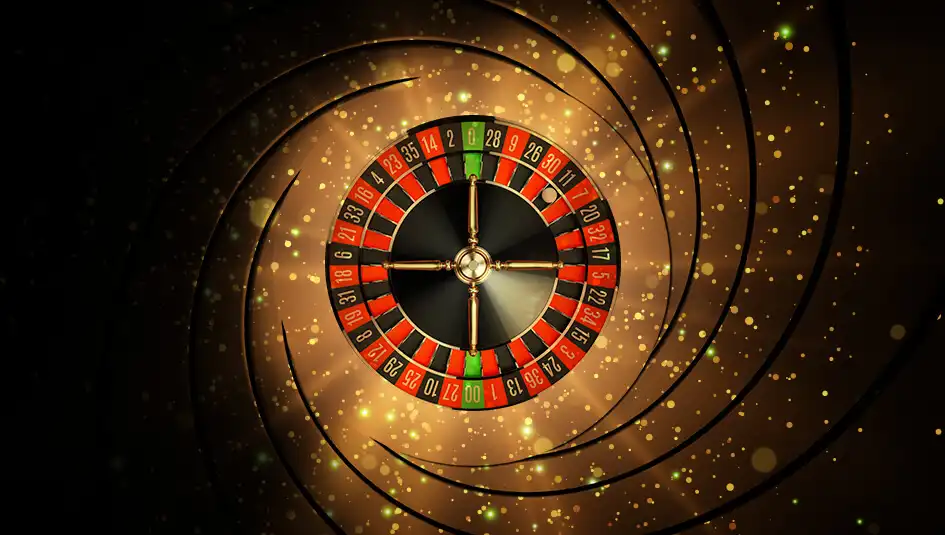While in the films James Bond was a baccarat player, those who have read the books will be aware that he was a keen player of Roulette. In the books, you can find details of his philosophy for playing the game. Like in any system, it is not full proof and it does have its share of advantages and disadvantages.
In basic terms, the James Bond philosophy relies on something referred to flat betting; this means that the player bets the same amount on every spin. However, there is a progression version that is explained further on. On each spin you the player places the following three bets: £14 on 19 – 36, £5 on the 13 – 14 – 15 – 16 – 17 – 18 Line bet, and £1 on 0. This means that the total bet on each spin will be £20.
In a nutshell it covers 25 numbers and leaves 12 that the player would lose on. As a result, there are only four possible outcomes from a spin:
- The ball lands on any number between 19 and 36 and wins the player £8
- The ball lands on 13, 14, 15, 16, 17 or 18 and wins the player £10
- The ball lands on 0 and wins the player £16
- The ball lands on 1 – 12 and the player loses £20
It doesn’t take a mathematical genius to realise that this strategy won’t cover the odds that are built into the game. If you were to play 37 rounds and each of the 37 numbers hit once then this would be the result:
- 1 spin would win £16 with the 0 bet
- 6 spins would win £10 with the Line bet, for a total win of £60
- 18 spins would win £8 with the 19 – 36 bet, for a total win of £144
- 12 spins would lose £20 when 1 – 12 hit, for a total loss of £240
Cover the Table Philosophy
Obviously the more of the roulette table covered by the player's bets the better the chances of winning. As a result, many people assume that by covering the roulette table with multiple bets they are sure to win, while this is true, it still doesn’t cover the odds of the game. It is impossible to cover all of the table and profit on every single spin. If it were, then casinos would very quickly be going out of business.
While you can win on every spin (simply bet on Reds, Blacks and Zero), you will always lose more than you would win. If you bet on Reds, Blacks and Zero you will win one of the bets with every spin, but you will also lose two and therefore you are losing more than you win.
That said, there are six different ways of covering the table while shooting for maximum efficiency:
- Betting on 35 Numbers –This is a fairly risky way of covering a large part of the table. If you were to bet £1 on 35 different numbers your total bet will be £35. You will win more bets that you lose but the problem is that every win returns a profit of just £1 and every loss is a loss of £35. In order for this to result in long term wins you would need 36 wins for every loss and ultimately, this isn’t very likely.
- Bet on 17 Splits – A Split bet is on two numbers that are adjacent on the roulette table. If you place 17 Split bets then you will have covered 34 numbers, just one less than betting on 35. The advantage is that you are only betting £17 to cover 34 numbers and your profit is still £1 when you win. The risk is slightly greater, but the outlay is less than 50%.
- Bet on 11 Streets – A Street bet is a bet on three numbers that form a “Street” on the betting area, for example 1, 2 and 3. If you bet on 11 Streets then you will be covering 33 numbers.
- Bet on 5 Double Streets (Lines) – A Double Street bet, also known as a Line bet, is a bet on two Streets together, or half a Dozen. If you bet on five at the same time then you have covered thirty numbers.
- 1-18 and third Dozen –Here you would bet £3 on the 1-18 even chance bet and £2 on the third Dozen. This way you will win £1 when either of the bets win. You will cover a total of 30 numbers. You can also reverse this and bet on the first Dozen and the 19-36 even bet chance. There is no real difference between this and betting on five double Streets as they both bet £5, cover a total of 30 numbers and return a profit of £1.
- 4 Splits and 2 Columns –This is a more interesting way of covering a large section of the wheel. You would bet £5 on any two Columns and £1 on four different Splits that are in the Column that you have not bet on. This way you will win £1 profit every time your Columns hit and a £4 profit if one of your Split bets win.

 Three Exciting Slots Arrive at mr.play Casino
Three Exciting Slots Arrive at mr.play Casino Discover Exciting New Slots at mr.play Casino
Discover Exciting New Slots at mr.play Casino